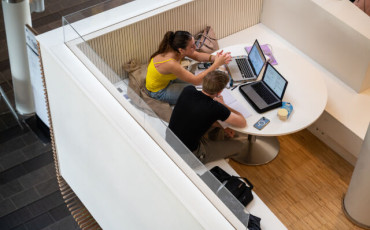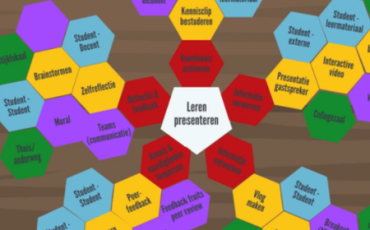Deze maand: docentprofessionalisering bij blended learning
Natasa Brouwer heeft het vijfde artikel in deze reeks voor je uitgekozen. Natasa is senior consultant bij de het Teaching and Learning Centre van de Faculteit der Natuurwetenschappen, Wiskunde en Informatica van de Universiteit van Amsterdam (UvA).
Het artikel van de maand september is: Garone, A., Bruggeman, B., Philipsen, B., Pynoo, B., Tondeur, J., & Struyven, K. (2022). Evaluating professional development for blended learning in higher education: a synthesis of qualitative evidence. Education and Information Technologies, 1-30. https://doi.org/10.1007/s10639-022-10928-6
Wat je in dit artikel leest
Dit onderzoek kijkt naar blended learning vanuit het perspectief van de docentprofessionalisering op dat gebied. De focus ligt hierbij op de hoe je initiatieven van docentprofessionalisering kunt evalueren en wat je daaruit kunt leren. De auteurs gebruiken daarvoor het vijf-lagen-raamwerk van Guskey dat de reacties van de deelnemers meeneemt, wat ze hebben geleerd, wat de organisatorische ondersteunings- en veranderingsfactoren zijn, hoe de deelnemers de nieuwe kennis en vaardigheden gebruiken, maar ook de studentresultaten van de vakken die gerelateerd zijn aan het bestudeerde docentprofessionaliseringsinitiatief.
De auteurs concluderen dat met name speciale aandacht nodig is voor technologie en infrastructuur aan universiteiten waar docenten hun tijd moeten verdelen tussen onderwijs en andere taken. Ook laten ze zien dat evaluatie op alle niveaus plaats moet vinden, met speciale aandacht voor de veranderingen op institutioneel niveau.
Waarom we dit artikel hebben geselecteerd
Cursussen transformeren tot een blended learning (BL) opzet is bedoeld om het leren van studenten te verbeteren, en niet om de hoorcolleges te vervangen of gebruik te maken van een extra leerplatform. Om deze verandering te bewerkstelligen is docentprofessionalisering in het hoger onderwijs onontbeerlijk. Het doel van de docentprofessionaliseringsinitiatieven voor universitair onderwijzend personeel is om effectieve onderwijsaanpakken te implementeren om de leerresultaten van studenten te verbeteren. Evaluatie is daarom belangrijk voor de ontwikkeling van BL. Deze studie geeft een inzicht in de manier waarop de evaluatie van docentprofessionalisering voor BL het beste wordt georganiseerd. De auteurs geven aanbevelingen voor de integratie van evaluatie in docentprofessionaliseringinitiatieven over BL.
Hoe sluit dit aan op jouw onderwijspraktijk?
Herken je dit binnen je eigen instelling? Hoe is docentprofessionalisering op het gebied van blended learning georganiseerd op jouw instelling? Worden de docentprofessionaliseringsinitiatieven geëvalueerd?
Welkom om je gedachten hier te delen!
Kennis over blended learning opdoen
De Special Interest Group (SIG) Blended Learning en de Vraagbaak Online Onderwijs hebben de handen ineen geslagen. Elke maand selecteren deze twee SURF-communities speciaal voor jou een relevant wetenschappelijk artikel over blended learning dat interessant is om te lezen. We stellen je een prikkelende vraag en we stimuleren je om naar je onderwijs / omgeving te kijken en je kennis en ervaring te delen. We vinden het geweldig als je jouw antwoord hieronder of op LinkedIn met ons wil delen!
- Lees hier deel 1 in deze serie over docentstrategieën voor betrokkenheid.
- Hier lees je deel 2 over peerfeedback bij blended learning.
- Lees hier deel 3 over de effectiviteit meten van blended learning.
- En hier vind je deel 4 over gevoel van leren bij actief leren.
Foto door William Warby
via Unsplash
The science behind Blended Learning | Part 5: Professional development for blended learning in higher education
Blended learning is one of today’s main topics in higher education. A lot of research on the topic has been conducted over the past years which gives us the opportunity to look at what evidence there is. But it can be daunting. With so many scientific articles, so much information…where to start and what to read? No worries, we’ve got you covered. Each month we’ll pick one scientific paper on blended learning to get you started on expanding your knowledge on the topic.
This month: professional development for blended learning
Natasa Brouwer selected the fifth article in this series. Natasa is a senior consultant at the Faculty of Science Teaching and Learning Centre at the University of Amsterdam.
The article of the month of September is: Garone, A., Bruggeman, B., Philipsen, B., Pynoo, B., Tondeur, J., & Struyven, K. (2022). Evaluating professional development for blended learning in higher education: a synthesis of qualitative evidence. Education and Information Technologies, 1-30. https://doi.org/10.1007/s10639-022-10928-6
What to expect in this article
This research looks at Blended Learning from the perspective of continuous professional development of university teaching staff about blended learning. The approach of this research is to discuss how the professional development initiatives are evaluated and what we can learn from this. The authors use Guskey's five-layer framework that takes into account participants' responses, what they learned, organizational support and change factors, how participants use the new knowledge and skills, as well as student outcomes in the courses related to the studied professional development initiative.
Authors conclude that especially at universities where lecturers have to divide their time between teaching and other tasks, special attention is needed for technology and infrastructure. The authors show that evaluation should take place at all five levels, with special attention to the changes at the institutional level.
Why we think this article is a must-read
The transforming of courses into a blended format is to enhance student learning, rather than just replacing face-to-face lectures or making use of an additional learning platform. To make this change, professional development in teaching and learning is indispensable. The aim of the professional development initiatives for the university teaching staff is to help them implement effective teaching approaches to improve student learning outcomes.
Evaluation is an important element for development of blended learning that ensures transparency, continuity and efficient allocation of institutional resources. This study provides an overview of how best to organize the evaluation of professional development of academic teachers about blended learning and it gives recommendations on how to approach integration of evaluation into professional development initiatives for blended learning.
How does this align with your teaching practice?
Can you recognize this in your institution? How is professional development for blended learning organized at your institution? Do you evaluate it?
Welcome to share your thoughts here!
Gaining more scientific knowledge on blended learning
SURF’s Special Interest Group (SIG) Blended Learning and Vraagbaak Online Onderwijs will be working together from now on. Each month they will provide you with a relevant article on blended learning and an inspiring question. Easy, accessible and up to date. We invite you to share your thoughts on the selected articles either here or on LinkedIn.
Previous articles in this series:



0 Praat mee